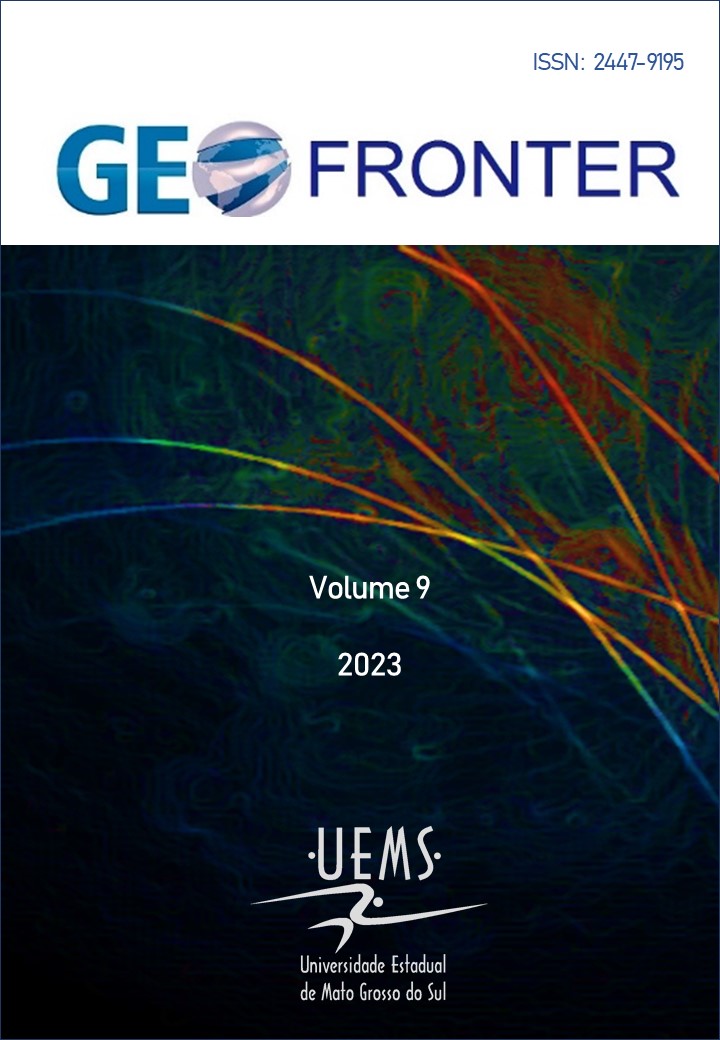UMA PROPOSTA METODOLÓGICA PARA O ESTUDO DA MOBILIDADE NO ÂMBITO DA GEOGRAFIA URBANA
Visualizações: 292DOI:
https://doi.org/10.61389/geofronter.v9i1.8271Keywords:
percursos acompanhadosAbstract
Beyond the central-peripheral logic that characterized the structuring of the urban center in Brazil, specially from the mid-20th century onwards, other logics are identified that complexifies the structuring of their spaces, marked by the deepening of socio-spatial inequalities. In this context, seeking to understand the passage from the predominantly center-peripheral socio-spatial logic to the fragmented socio-spatial logic, having as an empirical dimension the socio-spatial mobility of people in the cities of Campo Grande and Dourados in Mato Grosso do Sul, we present a methodology using audiovisual resources through an action camera articulated with the tracked routes carried out with people with focus on capturing the movement and its contents in their socio-spatial mobilities. We detail this methodology by presenting the steps, procedures and materials produced. We consider that the results obtained through it are substantially different from those achieved by static procedures, because keep moving with the research subject is essentially different from capturing their movement from remote mechanisms, since the transitory experience of movement in urban space exposed to its multiple spatiotemporally marked events, combined with the activation of human senses, enables a more accurate reading of the countless conditions in which movement occurs.
References
BALBIM, R. Mobilidade: uma abordagem sistêmica. In: Cidade e movimento: mobilidades e interações no desenvolvimento urbano / organizadores: Renato Balbim, Cleandro Krause, Clarisse Cunha Linke. – Brasília : Ipea : ITDP, 2016.
BÜSCHER, M.; URRY, J. Mobile Methods and the Empirical. European Journal of Social Theory. (2009) 12(1): 99–116. DOI: https://doi.org/10.1177/1368431008099642
CRESSWELL, T. Mobilities II: Still. Progress in Human Geography. 36(5) 645–653. 2012. DOI: https://doi.org/10.1177/0309132511423349
CRESSWELL, T. Mobilities I: Catching up. Progress in Human Geography. 35(4) 550 -558. 2011. DOI: https://doi.org/10.1177/0309132510383348
CRESSWELL, T. Towards a politics of mobility. Environment and Planning D: Society and Space. 2010, volume 28, pages 17 – 31. DOI: https://doi.org/10.1068/d11407
GARRETT, B. L. Videographic geographies: Using digital video for geographic research. Progress in Human Geography. 2011 35: 521 originally published online 6 December 2010. DOI: https://doi.org/10.1177/0309132510388337
GOMIDE, A. Á. Transporte urbano e inclusão social: elementos para políticas públicas. TEXTO PARA DISCUSSÃO No 960. IPEA. Brasília, julho de 2003.
JESUS, P. M. ; CATELAN, M. J. ; CALIXTO, M. J. M. S.. Percursos acompanhados Casa-Trabalho-Casa. Perspectivas e construção metodológica. In: Metodologia de pesquisa em estudos urbanos. Procedimentos, instrumentos e operacionalização. 1ed.Rio de Janeiro: Consequência, 2022, v. , p. 149-172.
PRÉVÔT-SCHAPIRA, M. Fragmentación espacial y social: conceptos e realidades. Perfiles
Latinoamericanos, n.19, p. 33-56, dez. 2001.
PRÉVÔT-SCHAPIRA, M.F.; PINEDA, R. C. Buenos Aires: la fragmentación em los interstícios de uma sociedade polarizada. Eure, Santiago do Chile, v.XXXIV, n. 103, p.73-92, dez. 2008. DOI: https://doi.org/10.4067/S0250-71612008000300004
SHELLER, M.; URRY, J. Mobilizing the new mobilities paradigma. Applied Mobilities, 2016. DOI: https://doi.org/10.1080/23800127.2016.1151216
SHELLER, M.; URRY, J. The New Mobilities Paradigm. Environment and Planning A. 2006, volume 38, pages 207-226. DOI: https://doi.org/10.1068/a37268
SHELLER, M. The new mobilities paradigm for a live sociology. Current Sociology Review 2014, Vol. 62. DOI: https://doi.org/10.1177/0011392114533211
SPINNEY, J. A Chance to Catch a Breath: Using Mobile Video Ethnography in Cycling. Research, Mobilities, 6:2, 161-182, 2011. DOI: https://doi.org/10.1080/17450101.2011.552771
SPOSITO, E. S.; SPOSITO, M. E. B. Fragmentação socioespacial. Mercator, Fortaleza, v.19,
Downloads
Published
How to Cite
Issue
Section
License

This work is licensed under a Creative Commons Attribution-NonCommercial-NoDerivatives 4.0 International License.
Os autores concedem à revista GEFRONTER os direitos autorais sobre o texto aceito para publicação. Autorizações especiais podem ser concedidas mediante aceite do editor do periódico.
